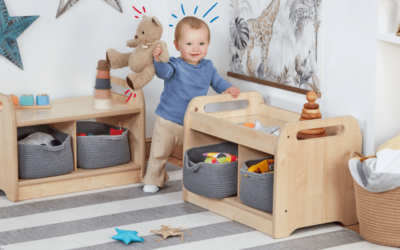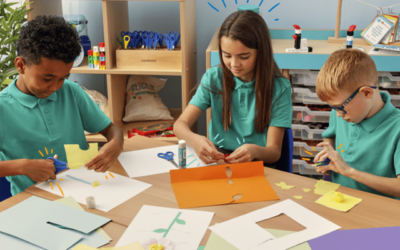Mental health and wellbeing in the workplace
We all recognise the importance of mental health and wellbeing, both at home and in the workplace, so we have come up with some activities to improve them as well as explaining why they may help. It is important to remember that putting your wellbeing first is not selfish or wrong, it simply means you’re in a better position to help others!
Luckily for you, you probably work in a childcare setting, and children are wonderful spirit-lifters. Whether they are making you laugh, keeping you extra busy or pretty much forcing you to go outdoors. But as people who work or live with young children, the pressures you face can often take a toll on your wellbeing.
You may feel a constant added pressure to look happy, even if you don’t feel it, in order to protect them, and this can only add to your stress levels. We believe, it would make more sense to look after yourself in order to be best equipped to helping them.
We’ve put together some basic steps that you can take to put your wellbeing first and tried to give you a little insight into why these steps might work wonders.
6 Activities to improve general mental health and wellbeing
1. Go for a walk. It sounds so simple however serotonin refers to a chemical in our brains which is linked to happiness and wellbeing. Low mood is linked to low serotonin levels in the body, which could be boosted by exercise and sunlight. Although we don’t always get the chance, make time! Get outdoors and go for a walk this Sunday. Alone, or with the children – we’ll let you decide. We recently talked about how important it is for early years children to spend as much time outdoors in winter as they do in summer, so this is your perfect opportunity! The fresh air and daylight will certainly do you good. It will also be a great opportunity to clear your head, think about the weeks and months ahead and get some exercise in at the same time.
2. Talk to your friends, colleagues, and family. They are most likely going through a lot of the same life related issues as you, most of the time. In fact, it can be quite comforting to reach out and speak to people in a similar boat. Give them a call and ask how they are doing, laugh about things, anything, and listen. As for your colleagues, they can most likely relate to pretty much every worry or stress you go through, so turn to them for a chat. Drop them a call and come up with some ways to lift the mood, or some activities for you and the children.
3. Eat well. Our diets can affect so many different things! From mood swings and tiredness to energised and positive, the food we choose to eat can play a huge part in how we’re feeling within ourselves. Healthy foods are linked to happiness and wellbeing, with sweet potatoes, bananas and green vegetables known to actually boost your mood and release energy. Regular meals, five-a-day and plenty of fluids are encouraged to maintain positive thinking and a healthy mind, even in the trickiest of circumstances. You can even use this as an opportunity to teach about healthy food. Create colourful fruit salads with the children or do some sorting exercises with vegetables and fruits.
4. It is good to do some planning. It gives you some focus and encouragement, as well as helping you to feel more organised. It doesn’t have to be intense planning, either, you could plan what you’re going to eat for dinner next week, or where you would like to visit during the summer. It might also be helpful to read through our inspirational activities blogs, to plan some of the things you’d like to try out with the children. Have a look on Instagram or Pinterest for some inspiration, there’s lots on there and it’s fun to scroll! We post ideas all the time on our Instagram so give us a follow @hope_earlyyears
5. Stay organised. Have a clear out. If there’s ever a perfect time for a clear out – it’s now. Have a deep clean, sort through the cupboards, and throw away all the stuff you’ve not even looked at for months! If you feel too lazy, put some music on and have a dance whilst you do it. You’ll feel great afterwards.
6. Think positively. Whether you’ve been down in the dumps for a day, week, month or whole year, it’s time to look on the bright side. We’re not saying force yourself to feel happy but take more time to appreciate things that you’re grateful for. Writing a list of all the things you feel happy to have, or all the things you love, is a great start.
You can also read more about how to stay active and the benefits this has on your wellbeing in our other blogs.
Follow us on Instagram, Facebook and Twitter for inspiration, play ideas, encouragement, updates, news, events and more. Don’t miss out.
Related blogs
Your Guide to the School-Based Nursery Capital Grant
What is the School-Based Nursery Capital Grant? For schools aiming to enhance their nursery facilities, the School-Based Nursery Capital Grant provides a simple funding solution. This grant is open to eligible state-funded primary schools in England that...
What Goes In, Must Go Out
Creating a Circular Economy in Your Nursery Author: Nick Corlett Sustainability Manager at LEYF Sustainability is more than a trend—it’s a shared responsibility, and the nursery is the perfect place to nurture these skills. Every day...
Top tips to create a SEND-Friendly Primary School Classroom
Author Lindsay Robinson Lindsay Robinson has been a primary school teacher for 23 years and is passionate about achieving the very best outcomes for children through quality first teaching and experiences. I remember receiving very little guidance during my teacher...


